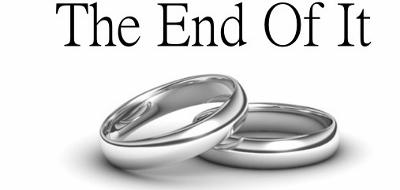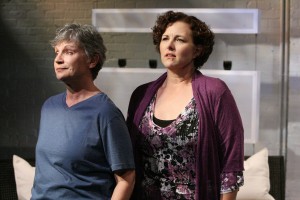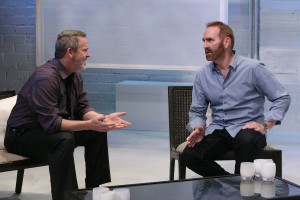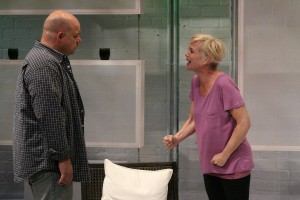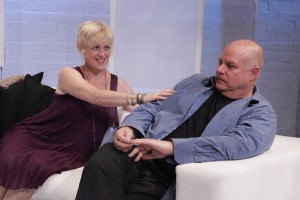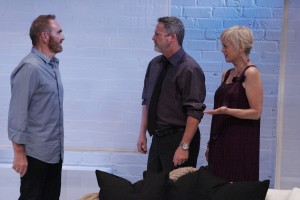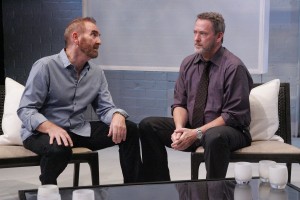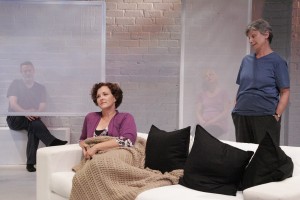MID-LIFE MYSTERIES AND MISUNDERSTANDINGS
A long-married couple says good-bye to the final guests who leave their house after a party. They are known for their parties; for their happy marriage; for their easy charm with one another.
Except that tonight, the husband asks his wife for a divorce, shocking himself as well as her. Then, with no warning, the wife is replaced by another actor, a man. And the husband is also replaced by another male actor. The two men are the same married couple, having the same conversation. In turn they are supplanted by a lesbian couple in the same marriage, on the same marital brink.
The stakes are high. These aren’t kooky twenty-somethings who, upon deciding they’ve made the wrong choices, can just make some new ones. When you’re fifty and think you’ve gotten it wrong, the implications are devastating. Making new choices isn’t simple or clean. And there is always wreckage that can’t be fixed.
Six actors play the characters—three as a version of the one leaving and three as a version of the one being left. It’s a clever narrative device, but playwright Paul Coates is interested in more than stylistic innovation or gimmickry.
There is the obvious point that marriage is marriage, happy or unhappy; straight, gay, or lesbian. Yet I think Coates is reaching for something beyond that as well.
In looking at the same issues that pull these three versions of the same couple apart, the variety of genders and performances pushes us to look deeper at our own notions of marriage and happiness. When three different actors say some variation of, “You’re suffocating me, and I’ll die unless I get out of this marriage,” it’s harder somehow to take what they say at face value.
Is this a marriage that actually should end? Or is the one who wants out just mistaking his/her own midlife crisis for proof that the marriage has run its course?
The title clues us in to how the situation will be resolved; but whether it is the right choice or not is another issue—made all the more complex when at times, the different couples overlap, with the spouse of one couple interacting briefly with her/his counterpart from a different couple.
Kelly Coffield-Park (Joanna), David Youse (Joseph), and Ferrell Marshall (Jo) play the straight, gay, and lesbian version (respectively) of the spouse who is blindsided by her/his spouse’s divorce announcement. (Getting the pronouns right is going to drive me crazy here.) In all three cases, the character is funny, pushy, controlling, entitled, and hardly apt to play the victim.
Playwright Coates plays the straight male version of Drew, opposite Joanna; William Franklin Barker is Andrew, opposite Joseph, and Wendy Radford is Dee, opposite Jo. These three actors play their versions of the same character with more variation than their counterparts, but in all three cases, the character emerges as smart, desperate, eager to please, and anxious to get out yet cause as little pain as possible.
Good luck with that.
Drew/Andrew/Dee is leaving for a business trip to London the next morning, and there is no way in hell Joanna/Joseph/Jo is going to let him/her simply make the announcement, go right to bed, and then leave for London.
Anyone being left wants a reason. Anyone leaving struggles to put it into words in a way that will satisfy the other person. For me, Drew/Andrew/Dee never really makes the case—but that is absolutely my own personal reaction. I think just as many people could believe the opposite.
Coates gives us a multi-faceted exploration without heroes or villains, but it is human nature to pick sides, and I found myself firmly in Joanna/Joseph/Jo’s corner; shaking my head at the terrible mistake Drew/Andrew/Dee is making.
That says more about me than about the play. And that’s the point, as well as the main strength of Coates’ writing. The audience has a communal experience that becomes very personal.
Coates is aided immeasurably by the sure-handed, inventive direction of Nick DeGruccio. He stages the overlapping couples fluidly, fully utilizing François-Pierre Couture’s wonderful, deceptively simple set.
DeGruccio also successfully achieves a balance between each set of three characters—they feel very much like the same person but still emerge as individuals.
The acting is excellent.
Coffield-Park and Coates set the tone beautifully. They are immediately believable as a couple who have been together for 20 years. His yearning to breathe is palpable; her shock and fear is powerful and real. When her large eyes open in wide confusion and tears come, your heart breaks for her.
Youse is equally rooted in his version of the character’s utter disbelief at what is happening. Like Coffield-Park, he creates a fully realized person with everything to lose. As his husband, Barker gives us a real sense of the tenderness that still lingers, even as he constantly looks for a successful exit strategy.
Marshall and Radford have a different vibe that works. Radford makes Dee more in charge than her straight and gay counterparts; and Marshall lets Jo seem more likely to completely fall apart.
Whether by chance or by design, there’s something fascinating about the fact that the two women seem to have more personality variances between them as a couple, than do the straight couple or the gay men. Gender can be the least of what makes people different.
There are lightning-fast shifts from anger, to hurt, to humor, to reminiscence. They never feel like constructed transitions. They just feel like life.
The End of It does call to mind last year’s brilliant Three Views of the Same Object by Henry Murray from Rogue Machine Theatre. In that play, three different endings to the same couple’s life together are explored. The element of suspense is always present since we don’t know how the stories will turn out. Coates sets himself a trickier job. We know what will happen. But to his credit, we can still hope for the best.
photos by Michael Lamont
The End of It
a guest production at the Matrix Theatre
presented by End LA and Scott Disharoon
scheduled to end on October 20, 2013
for tickets (323) 960-4418 or visit http://www.plays411.com/theend
